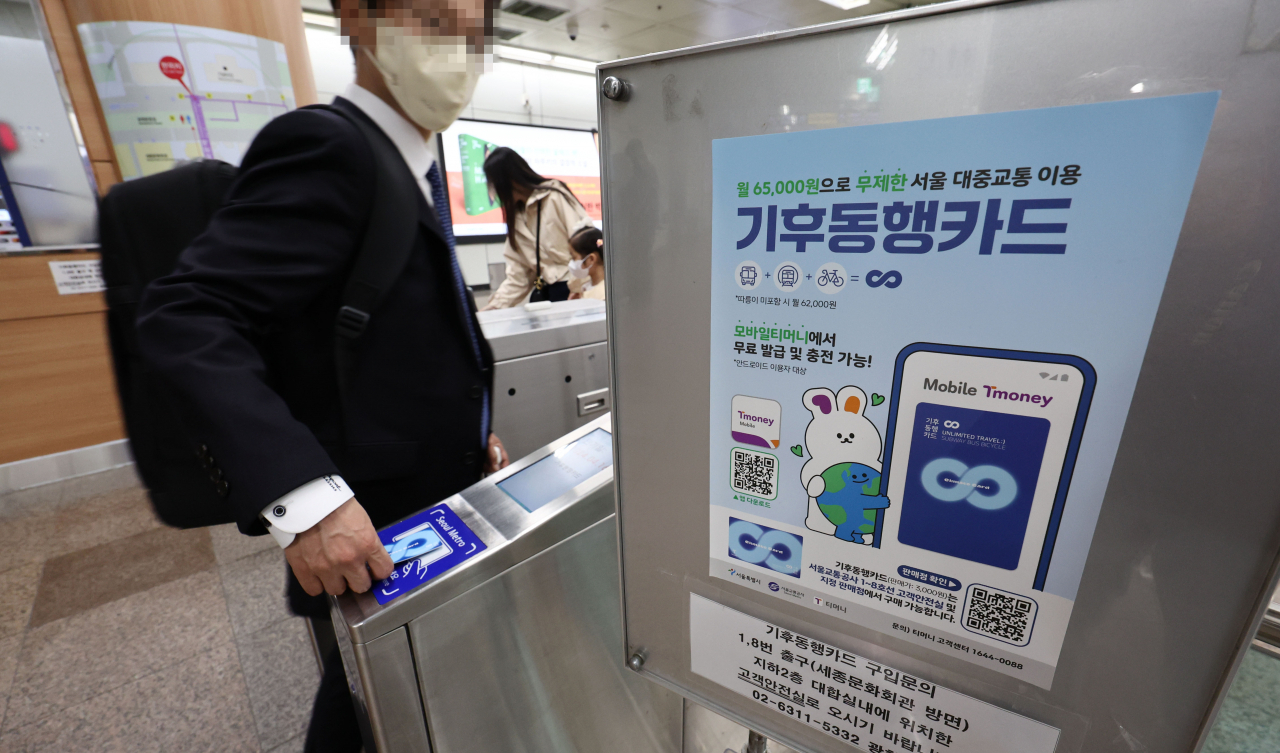 |
Commuters pass through the turnstiles in a subway station in Seoul on Sunday. (Yonhap) |
Seoul’s all-inclusive monthly transit pass, the "Climate Card," surpassed 1 million issuances last week, just 70 days since its debut, the Seoul Metropolitan Government said Monday.
According to the city's data, the number of climate cards issued as of Friday had reached 1,008,000, since its launch on Jan. 27. Of the total, mobile-only cards accounted for approximately 49 percent, while the remaining 515,000 issuances were for physical cards, a city official said.
The number of pass users has been on the rise, increasing to 503,829 as of April 2 from the initial count of 71,452 on the first day of the service launch.
The transit pass, launched in January as an initiative to relieve commuters of the financial burden of transportation costs and promote a reduction in greenhouse gas emissions, offers unlimited access to the subway and bus networks of Seoul, as well as to the city's public bicycle-sharing service, Ttareungyi, for a fixed monthly fee.
For 65,000 won ($48) per month, users are entitled to unlimited rides within the city on subways, buses and public bikes. Users can also choose to pay 62,000 won to exclude the bike-sharing service from the plan.
In February, the capital rolled out a discounted option for commuters aged 19 to 34 that brings the monthly fee down to 58,000 won with the bikes or 55,000 won without.
The number of Climate Card users within that age group increased to around 250,000 as of March 27, up from about 130,000 on Feb. 21 before the launch of youth discounts.
A major complaint from card users has been that the transit pass does not cover destinations outside the capital city, while many commute to Seoul from their homes in the Greater Seoul area, encompassing Gyeonggi Province and Incheon.
Starting from March, pass holders can travel via the Gimpo Goldline, which links Gimpo International Airport in Seoul and the adjacent city of Gimpo, marking the first occasion for the pass to extend its coverage beyond Seoul.
According to city officials, they plan to further expand the coverage of the transit pass through discussions with neighboring cities.
Officials also noted a plan to enable the charging of physical cards through debit and credit, as kiosks inside stations currently only accept cash.
At present, the mobile version of the card is only accessible for Android users through the Mobile T-Money app, while physical cards are available for purchase from information centers within subway stations or convenience stores nearby.







![[Today’s K-pop] Blackpink’s Jennie, Lisa invited to Coachella as solo acts](http://res.heraldm.com/phpwas/restmb_idxmake.php?idx=644&simg=/content/image/2024/11/21/20241121050099_0.jpg)